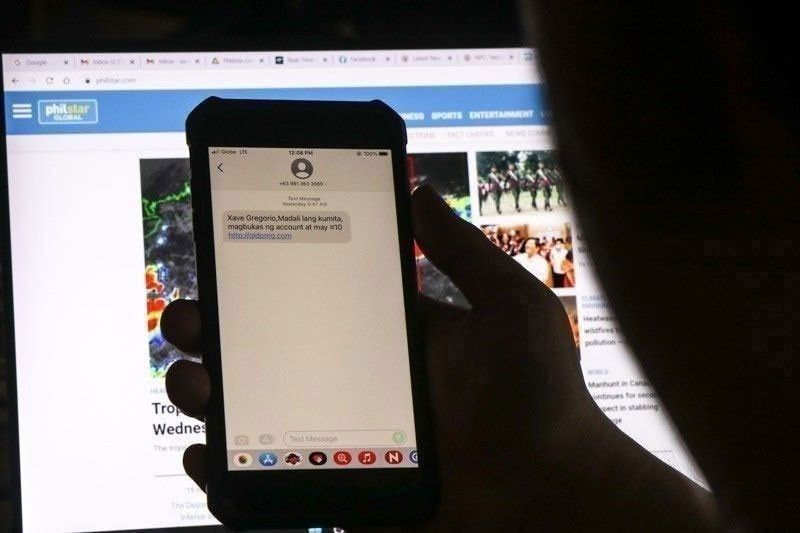Report spoof messages, online scams, public urged

MANILA, Philippines — With online scams appearing to continue unabated, the Cybercrime Investigation and Coordinating Center (CICC) has urged the public to be more alert and report new tricks employed by scammers – including sending “spoof” messages – to help authorities track and prosecute them.
In an interview yesterday with “Storycon” on One News, CICC deputy executive director Assistant Secretary Mary Rose Magsaysay said cybercriminals have found “creative” ways to scam people, especially after the implementation of the SIM card registration law.
Some, for instance, are using “text blasters” to make it appear that the messages come from legitimate sources such as financial institutions and mobile wallets.
Fraudsters are also using other messaging platforms to send scam messages, she added.
“We encourage you to call 1326, our CICC hotline, because every single call and number and instance that we (receive), we get to be able to find out where exactly are these text blasters roaming around,” Magsaysay said.
“Sometimes it’s in a car, sometimes it’s in a tower. It’s cheaper to steal that way,” she added, referring to the use of “spoofing” devices.
The CICC official said they are working with other government agencies and the private sector to address the issue.
Popular mobile wallets such as GCash and Maya, as well as banks with digital platforms, have repeatedly issued warnings against online scams, including those that use spoofing devices to make it appear that the messages come from them.
They warned the public not to click on links or share one-time passwords or codes sent to their registered devices.
Senate Minority Leader Aquilino Pimentel III has also issued a warning against “holiday-themed” scams this Christmas season.
“Let us be careful this Christmas season. There are scammers out there waiting for the opportunity to fool people,” Pimentel said.
He cited an advisory from the National Telecommunications Commission, cautioning the public against “phishing” wherein unsuspecting victims are scammed by clicking links in what appear to be legitimate text messages.
These links can compromise one’s personal information and financial security, the senator said.
“Make sure the messages are legitimate before clicking on links,” Pimentel said. “Caution is key to avoid scams.”
Bogus Facebook pages
The Professional Regulation Commission (PRC), for its part, has also warned the public against unauthorized Facebook pages that are giving out exam-related information.
In an advisory, the agency said that PRC-related advisories and official announcements, particularly on exam-related information, shall only be posted on the official website of the PRC at https://prc.gov.ph/, PRC Facebook page at https://www.facebook.com/professionalregulationcommission and PRC Twitter handle at @PRC_main.
PRC stressed that it does not authorize any Facebook account other than the above-listed pages.
PRC said it shall not be accountable for the accuracy, veracity or content of any information provided by or appearing from unauthorized sources, as the PRC does not officially publish them.
Furthermore, the commission said it is expressly disclaiming liability for damages of any kind arising out of use of, reference to or reliance on any information contained within unauthorized sites and pages.
“For security purposes, the public is advised to refrain from engaging with unauthorized websites or Facebook pages and to follow or refer only to the PRC’s official website and social media handles,” said the PRC.
Also on Storycon, an official of the Department of Labor and Employment (DOLE) yesterday said various interventions are being implemented to address the possible impact of emerging technologies such as artificial intelligence (AI) on the country’s workforce.
Patrick Patriwirawan Jr., director of DOLE’s Bureau of Local Employment, said they continue to monitor emerging industries and other transformations in the labor market.
“Part of that is looking at what would be the skills that would be required by our labor market in the private sector. What are the competencies that they will need, and do we have the supply or the workforce for those that will be emerging in the near future?” he said.
Patriwirawan was reacting to a recent report of the International Monetary Fund, which found that 36 percent of jobs in the Philippines may be affected by the emergence of AI.
He recognized studies showing that routine or repetitive tasks or skills “are very vulnerable to automation and digitalization.”
More than half, the IMF report said, are considered “highly complementary” jobs or those that can be supported rather than replaced by AI.
The DOLE official recognized the upskilling and reskilling interventions being done by the private sector to ensure that their employees can adapt to emerging technologies.
“On the part of the government, in the Department of Labor and Employment, we have our developmental interventions that would cater to needs of our employers, particularly looking at how we can increase the awareness (about digitization) of our workers and the students who will join workforce,” he said in English and Filipino.
He cited their youth employability program, which now focuses on “core skills training” to develop high-level skills such as critical thinking, decision-making and time management, among others.
“It’s important to build these (skills) at the early stages of development to ensure their employability in the future,” he said.
For workers, he said DOLE and other government agencies are providing skills development interventions to increase their awareness on digitalization, AI and other emerging technologies.
“We have the Philippine Digital Workforce Competitiveness Act. It’s a new law, which creates a council that monitors all digital skills training provided by the government,” Patriwirawan said.
“We need to make sure that all these interventions have the same intentions of increasing the employability of our workforce,” he added. — Marc Jayson Cayabyab,
- Latest
- Trending



























